Author: Ira Somers
Date: July 4, 2019
Publisher: Massivit3d
In 2017, Media Resources ’ co-owner, Steve Gallow, got his break into the movie industry, not as an actor, rather as a prop fabricator. The break came when one of the many contacts he had been nurturing popped into his Toronto facility during a local movie shoot and saw the Massivit 3D printer.
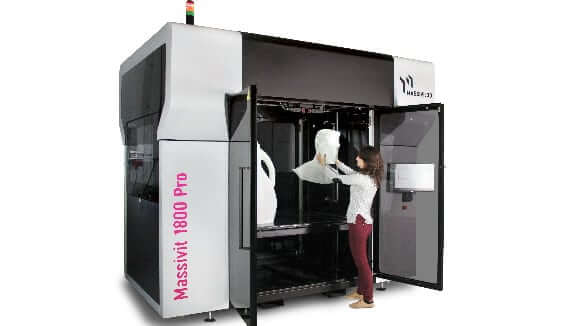
He asked if Media Resources could create a 26ft. (7.9m) tall prop for an upcoming scene in the movie currently being filmed, IT: Chapter Two, based on Stephen King’s novel. This break—and the giant prop—was just one of many good things to come.
We asked Steve Gallow some questions about 3D carving, 3D printing, and how their Massivit 3D printer has affected his business and its bottom line.
M3D: Let’s start with the question everybody has. Are you making the money you expected with this big 3D printer?
SG: Absolutely.
M3D: How does the profitability of adding 3D printing to your business compare with other technology you’ve adopted?
SG: None of the other technology we adopted attracted the attention our Massivit 1800 3D printer has. It increased our revenue by over $1 million the first year and boosted our other business as well. Our customers and prospects wanted to see the machine, and their visits led to job orders, many of which were not even 3D printing jobs.
In terms of leads, we used to get one lead a month through social media but since we added the Massivit 3D printer, we average about 3 leads every day. (Other Massivit 3D customers report similar amazing results.)
“In terms of leads, we used to get one lead a month through social media but since we added the Massivit 3D printer, we average about 3 leads every day.”
M3D: How much revenue are you expecting large 3D printing to bring in this year, your second year with the Massivit 1800?
SG: We are hoping to grow by 50% to $1.5 million this year. The demand is great and we could do even more if we had more space and more people.
M3D: You said customers and prospects want to see the machine. Can you tell us more?
SG: It is such a conversation starter. When we tell our customers, especially advertising agencies, that we have this large 3D printer, they not only want to see it, they start thinking of ideas and asking, “So, does this mean you can do this?”
The answer is yes. Yes we can.

Sure, we have a 3D-carving department, but foam cutting is limited and takes a lot of time. The Massivit 1800 shaves weeks off production time.
M3D: Since installing the Massivit 1800, did you have any surprises?
SG: I was surprised how it brought in business to our other departments. This was unexpected and good.
M3D: You often combine foam carving with 3D printing. What factors determine whether you divide a job among the different technologies?
SG: It really comes down to details. The Massivit 1800 is much better than foam carving at creating complex things and producing them quickly. Before, we were mostly making 3D props by hand but it was extremely time-consuming. We also used a foam CNC router but could not achieve the details we required. The Massivit 1800 changed that.

If a large model, or even part of a large model, has a lot of details, we use the Massivit 1800 for that part and foam for the other part. 3D printing can also save us time and money on finishing, not to mention there’s no mess to clean up afterward like there is with CNC or foam carving.
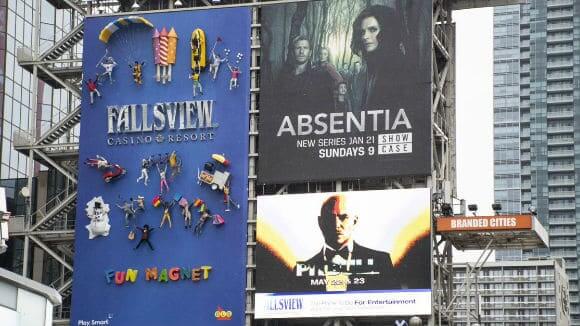
When we produced the Fallsview billboard, we determined it was most effective to 3D print certain elements. We could have 3D printed custom mannequins but the benefit was not there for this project, so we simply purchased all the mannequins and 3D printed other parts.
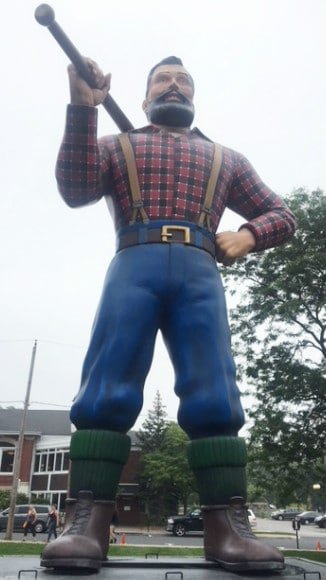
For this breakthrough 26ft. (7.9m)-tall Paul Bunyan movie prop, his head, hands, and boots required details that would have kept our 3D-carving guys busy for days. The Massivit 1800 3D printed them in hours. We carved the other parts and delivered the prop to the movie set quickly.
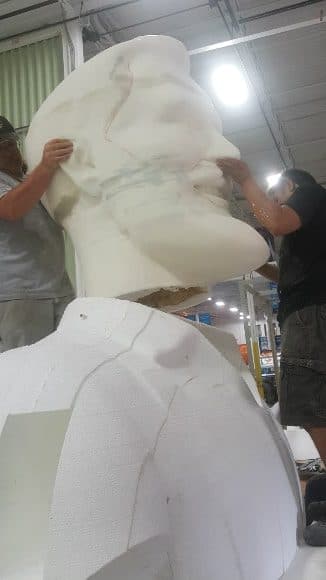
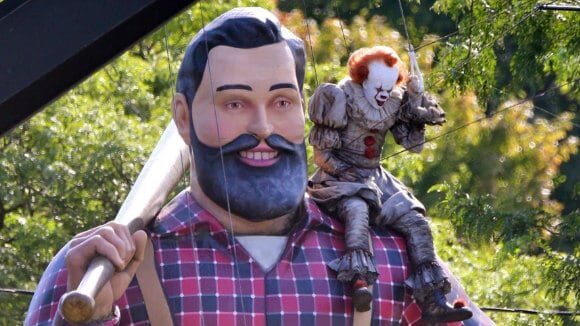
M3D: And that got you in the movie business. How is it going?
SG: 50% of our business now comes from the movie industry because of our Massivit 3D printer, so I’d say it’s going pretty well. We spent years trying to get our foot into the movie industry by offering 2D backdrops. It wasn’t until we were able to offer 3D-printed props that we got our first project.
Like other industries, the movie industry requires super-fast turnaround times, and our Massivit 1800 helps us meet those deadlines. It also allows us to deliver custom props.
M3D: What are your thoughts on early adoption of technology?
SG: I think it is important to stay ahead of the market and being early adopters is one way. Media Resources was an early adopter of digital printing, and it paid off for a number of years. But, eventually, the market caught up and the competition became intense. My margins became very thin due to commoditization. I used to charge $12 per square foot for digital vinyl printing. Now the market demands a price of $0.65 per square foot. It feels good to be able to offer large 3D printing, something nobody else in our area can do. It has helped our business, and now because we are the only game in town, we set our margins.
M3D: What is your secret to breaking into new markets?
SG: Prospecting is vital. After we decide what new industries we want to tap, we make many contacts in the industry and invite them to see our machine and what we can do. That’s how we broke into the movie business, and I am convinced we can help the sports industry as well as museums and amusement parks.
M3D: Big time.
Steve Gallow also spoke with IDC Senior Analyst, Tim Greene about the benefits of large 3D printing for businesses looking to overcome the challenges of the saturated wide-format print market. You can watch the full 44-minute webinar here!
Recap: Media Resources combines 3D printing and traditional technologies to best serve their clients and to help their own bottom-line. Large 3D printing with their Massivit 1800 far surpasses foam carving in speed, details, creating complex shapes, creating waste, and storage. Plus, the large 3D printer attracts interest that leads to business, and when offering cutting-edge new technology that enables you to outperform competitors, you can set your own margins. ????
Comment:
3D printing is at the brink of something big. Reading this article they talked about how customers just want to be a part of something that is 3D printed. It is a cool new technology that is starting to get a footing in the door of manufacturing. What I really like is there is almost no waste because it is an additive process as opposed to a subtractive one.




